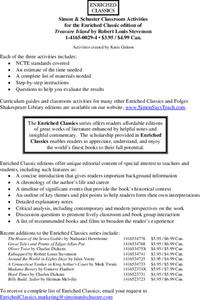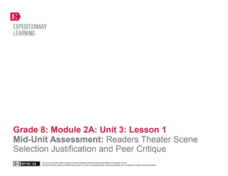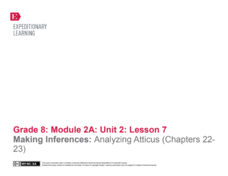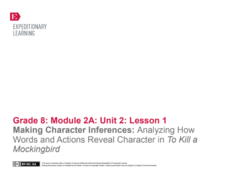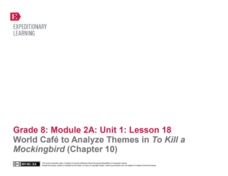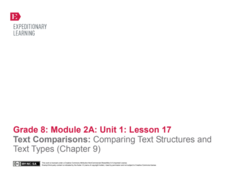Simon & Schuster
Classroom Activities for The Call of the Wild by Jack London
Three activities are designed for readers of Jack London's The Call of the Wild. First, class members research and create posters that reflect the setting of the novel. Next, groups create posters with images that represent each chapter...
Simon & Schuster
Classroom Activities for Treasure Island by Robert Louis Stevenson
Readers take part in three activities after reading Robert Louis Stevenson's Treasure Island. To understand the importance of diction, class members analyze Stevenson's characters' language to denote their social status. After completing...
National Endowment for the Humanities
Frederick Douglass’s Narrative: Myth of the Happy Slave
The firsthand accounts of what it was like to be an enslaved person in the mid-1800s riveted a nation and the issue ultimately led to civil war. Using excerpts from Frederick Douglass's autobiography, budding historians examine what it...
EngageNY
Mid-Unit Assessment: Justification for Character and Scene Selection
When it comes to love and midsummer nights, confessions are tricky. Learners place themselves in the shoes of a character from William Shakespeare's A Midsummer Night's Dream and explain how a character manipulated another character in...
EngageNY
Mid-Unit Assessment: Readers Theater Scene Selection Justification and Peer Critique
Is it justified? Readers complete the mid-unit assessment to justify their reader's theater scenes and quote choices from To Kill A Mockingbird. After completing the assessment, scholars conduct peer reviews and critique the script...
EngageNY
Writing an Argument Essay: Evaluating the Model and Crafting a Claim
Pupils prepare to write argumentative essays based on Shakespeare's A Midsummer Night's Dream. They begin weighing evidence and crafting claims for their writing about control.
EngageNY
Examining How Word Choice Contributes to Tone and Meaning: Close Reading of “Wet and Crying”
Scholars participate in a Write-Pair-Share activity while answering questions about the meaning of words in "Wet and Crying." They use their Write-Pair-Share note-catchers to guide their thoughts and then share with the class. After...
EngageNY
Writing an Argument Essay: Evaluating the Model and Crafting a Claim (Chapter 28, Including Synthesis of Scenes in Previous Chapters)
Scholars use the model essay from the previous instructional activity to create their own argumentative essays. Readers make a claim about Atticus defending Tom in To Kill A Mockingbird. They then use graphic organizers to develop and...
EngageNY
Four Corners: Taking a Stand in To Kill a Mockingbird (Chapters 24-26 Plus Synthesis of Scenes in Previous Chapters)
Think outside the box! Scholars work on the Frayer Model, completing boxes for the word integrity. They turn and talk with partners to discuss real-life examples and some from To Kill A Mockingbird. Readers then discuss integrity, taking...
EngageNY
Making Inferences: Analyzing Atticus (Chapters 22- 23)
What's the verdict? Scholars look closely at the reactions of various characters in To Kill A Mockingbird in the aftermath of the verdict. They circulate the room, responding to a variety of probing questions. Pupils finalize their...
EngageNY
Close Reading: Fishbowl Comparing Atticus and Mr. Gilmer (Chapters 17-19)
Class members participate in two circle group discussions to compare Atticus and Mr. Gilmer in chapters 17-19 of To Kill a Mockingbird. They use a note-catcher to guide their thinking. For homework, readers begin looking at chapters 20-21.
EngageNY
Making Character Inferences: Analyzing How Words and Actions Reveal Character in To Kill a Mockingbird
Partner up! After an I have/who has activity, readers partner with one of their discussion appointments to add evidence from chapters 11-13 in To Kill a Mockingbird to the Atticus Note-catcher. Partners then share with the class and add...
EngageNY
End of Unit 2 Assessment, Part 1: Drafting The Argument Essay
Scholars write the draft of their essays about Atticus's decision to defend Tom Robinson in Harper Lee's novel To Kill a Mockingbird. They support their claims with reasons, details, and quotes from the novel.
EngageNY
Comparing Meaning and Tone: The Fall of Saigon in Fiction and Informational Text
Who's that talking to? Readers listen to a reading of the "Forgotten Ship" transcript and answer questions focusing on word meaning and choice. They complete a chart to track the multiple narrators in the script. For homework, readers...
EngageNY
World Café to Analyze Themes in To Kill a Mockingbird (Chapter 10)
Time for table discussions. Scholars once again take part in a World Cafe activity. They discuss chapter 10 of To Kill A Mockingbird in groups of four and rotate from table to table. At each table, they select a new leader. Readers then...
EngageNY
Comparing Text Structures: To Kill a Mockingbird and “Those Winter Sundays” (Chapter 6 and 7)
Scholars carry out a close read of the poem "Those Winter Sundays" to determine its point. They look at the words used and the structure of the stanzas and then compare the poem's narrative structure to chapter 6 of To Kill a...
EngageNY
Analyzing Character: Understanding Atticus (Chapter 1, cont.)
Scholars use a Note-catcher to gather text evidence to reveal the character of Atticus Finch in To Kill a Mockingbird. After collecting evidence, they work with a partner to make an inference about the character and then share their...
EngageNY
End of Unit Assessment: How Word Choice Contributes to Tone and Meaning
It's finally time for pupils to show what they know! Scholars finalize the unit with an end-of-unit assessment. They use the book Inside Out & Back Again and the "Forgotten Ship" transcript to examine word choice, tone, and...
EngageNY
Mid-Unit Assessment: Getting to Know a Character: What Details in the Text Help Us Understand Ha?
Take a walk with me. Scholars participate in a gallery walk of the anchor charts their groups created about Inside Out & Back Again in the previous lesson plan. Pupils take notes about Ha's character on sticky notes as they take the...
EngageNY
Inferring about Character: Close Reading of the Poem “Inside Out” and Introducing QuickWrites
Grab a partner! Scholars partner up to take a second look at the verse novel Inside Out & Back Again. They discuss questions about and connections to the novel and then learn how to complete a Quick Write task properly. To finish,...
EngageNY
Launching the Novel: Character Analysis of Ha
Scholars receive numbers as they work in groups to read Inside Out & Back Again. The instructor calls out specific numbers for readers to share the group's thoughts. Then, they use a model passage to demonstrate the effective actions...
EngageNY
Text Comparisons: Comparing Text Structures and Text Types (Chapter 9)
Scholars revisit the comparisons they made in the previous lesson of "Incident" and To Kill A Mockingbird. They talk with their discussion appointment partners about the structure of a narrative and use a Compare and Contrast Note...
EngageNY
Jigsaw to Analyze Mood and Tone in To Kill a Mockingbird (Chapter 8)
We have an appointment! Scholars meet with another discussion appointment to discuss the text structure of the poem "Incident" by Countee Cullen. They use a Note Catcher to guide their thinking and compare the structure to chapter 8 of...
EngageNY
Inferring About Character: Atticus (Chapter 5)
As part of their study of Harper Lee's To Kill a Mockingbird, class members participate in a silent discussion of the novel using a Chalk Talk chart. They then respond to the teacher's questions by writing their thoughts on the chart....



